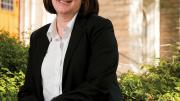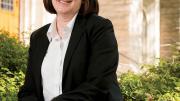“Let your women keep silence in the churches,” declares Paul in Corinthians 14:34. Catherine Brekus ’85 specializes in hearing the voices of America’s early female religious leaders, nearly lost to history—a casualty of neglect, or sometimes a more deliberate excision from the historical record. Her work has required some sleuthing—finding manuscripts scattered across libraries and antiquarian societies—and deep dives into material history, learning about everything from eighteenth-century medicine to laundry. Always striving for “empathetic engagement with the past,” Brekus easily gets swept up in describing past events. Her voice drops as she describes the revival leader at the center of her most recent book, Sarah Osborn’s World, noting the irony that a “free will person” should be the historian to delve into these fiercely Calvinist writings. In an interview upon winning the 2013 Aldersgate Prize (which annually recognizes works of Christian scholarship), Brekus said that in imagined debates, Osborn has “tried very hard to convince me”—though without success. “I did not like studying history in high school,” the Warren professor of the history of religion at Harvard Divinity School confesses, smiling. “I was always good at it…but the idea is that you memorize a lot of facts, mostly about political history, and what happened when.” When she taught the subject to high-school students for two years, Brekus noticed that textbooks “have this narrative of political events…and then you have this little human-interest thing in a box. That was where the women would appear. My goal as a historian,” she adds, “is to get women out of those boxes and into the main texts.”
Catherine Brekus, Harvard historian, studies women religious leaders
Catherine Brekus, Harvard historian, studies women religious leaders
A Harvard Divinity School specialist on women in early America

Catherine Brekus
Photograph by Stu Rosner

You might also like
How a Harvard Hockey Legend Became a Needlepoint Artist
Joe Bertagna’s retirement project recreates figures from Boston sports history.
Introductions: Mallika Monteiro
A conversation with a beer industry executive
Mount Vernon, Historic Preservation, and American Politics
Anne Neal Petri promotes George Washington and historic literacy.
Most popular
Explore More From Current Issue

These Harvard Mountaineers Braved Denali’s Wall of Ice
John Graham’s Denali Diary documents a dangerous and historic climb.

What Bonobos Teach Us About Female Power and Cooperation
A Harvard scientist expands our understanding of our closest living relatives.






